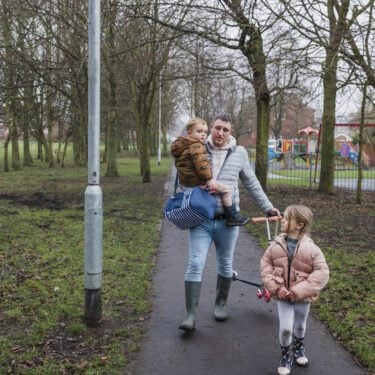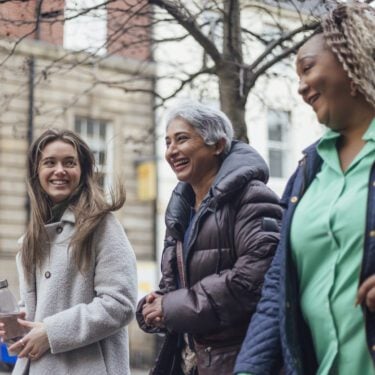Almost as soon as lockdown and other measures to minimise the spread of COVID-19 were introduced in March, it became apparent that the pandemic posed a significant threat not only to our physical health, but also to our mental health and well-being.
One of the first research projects to track the psychological and social impact of the pandemic was the UCL COVID-19 Social Study, which began surveying people weekly on 21 March. There are now over 70,000 people participating and the findings have provided valuable real-time evidence on then trajectories of people’s well-being over the last six months. The Nuffield Foundation funds this study, which also receives support from Wellcome and UKRI.
At our recent webinar to explore the mental health impacts of the pandemic, the study’s lead researcher, Dr Daisy Fancourt, reported that across different measures, including anxiety, life satisfaction and loneliness, there was a dramatic decrease in mental health as lockdown began. While there were signs of improvement in the summer as lockdown eased, the population’s mental health is still far off so-called ‘normal’ times.
The comparison with pre-COVID times was explored by Xiaowei Xu from the Institute of Fiscal Studies, whose research shows almost a quarter of people have experienced at least one mental health problem much more than usual, up from 10% in the most recent pre-crisis data. Both studies show stark differences between different groups, with the biggest deterioration in mental health seen among women and young adults – groups that had relatively high levels of mental ill-health prior to the pandemic. As with many other impacts of the pandemic, pre-existing inequalities have been exacerbated. For example, levels of anxiety among people from ethnic minority backgrounds and lower income households have not improved as much as other groups since lockdown eased, which is clearly a cause for concern.
The presentations and discussion raised three themes that are interesting to consider.
Firstly, the particular experience of young adults. A recurrent theme from both studies was the impact on the lives of young adults. While at lower risk of the more severe physical effects of the virus, young adults were more likely to report that their lives were largely or completely different in lockdown (60% vs 40% of those aged 60+). Loneliness is often considered an issue for older people, however younger adults and students were much more likely to be experiencing high levels of loneliness than before the pandemic. As has been reported in the news in recent weeks, these issues are particularly prevalent among students away at university, and other young people embarking on new work-based learning or starting new education and training courses.
So how do we better support young adults in a way that recognises the challenges they face? Daisy’s analysis suggests that uncertainty could be a trigger for mental health problems, even for those not experiencing adversity. She also finds that most people are following the government guidelines, which raises the question of whether there is potential for a different approach to the communication of public health messages in order to reduce the risk of unnecessarily increasing anxiety.
Second, understanding the experience of underrepresented groups in research. Dr Ruth Patrick reported on emerging findings from her COVID Realities project, which is documenting the experiences of parents and carers on low incomes. One such finding was that initiatives intended to support the economy, such as Eat Out to Help Out, can leave those unable to take part feeling more isolated, while the shift to online teaching created additional stress and anxiety for those without reliable internet access (this finding is consistent with NFER research we have funded on engagement with remote learning).
Dr Dharmi Kapadia drew attention to gaps in the data about different ethnic minority groups, both in relation to mental health and generally, with insufficient disaggregation of overarching groups such as ‘Black’ or ‘Asian’. The Centre on the Dynamics of Ethnicity is establishing a new survey of 16,000 people which will include questions on mental health and provide much-needed larger scale data to address a key gap in our knowledge.
Third, the gender gap in mental health. Both Daisy and Xiaowei highlighted the persistent gender gap in mental health, with women being more likely to report depression and anxiety both prior and during the pandemic. However, Xiaowei also noted an exception: a large increase in severe mental health problems amongst older men. We also know that men can be more reluctant to disclose mental health problems, so the increasing gender gap does not necessarily represent the full picture. The provision of mental health treatment and support needs to take into account the varying levels of need across different groups of the population, including those less likely to seek help.
The role of social prescribing
James Sanderson, Director of Personalised Care for NHS England and Improvement, spoke about the importance of the community NHS response to the impact of COVID-19. Across the country, link workers in primary care settings have been providing non-clinical community support to patients who are experiencing difficulties with loneliness, housing, debt and so on. By deploying a model that asks people what matters to them rather than what is wrong with them, we can help provide more personalised care.
Addressing long-standing inequalities
We have seen many times this year – and not for the first time – evidence about the structural factors that define the differential health, economic, education and other social experiences both in the UK and globally. The evidence provides a compelling case for policy design and implementation that supports mental health from the outset, to avoid compounding the trends we have seen in the last six months and to actively address long standing inequalities. As Daisy reflected, we need to recognise the long term nature of the mental health impacts of the pandemic, including how people respond to adversity and loss, the impact of delayed diagnoses and the ongoing economic and social challenges associated with a recession and Brexit.
These issues are at the heart of the Foundation’s mission to advance educational opportunity and social well-being and we will continue to work with the research and policy communities to strengthen the evidence base and inform policies that support this goal.
Watch the event recording
About the author
Cheryl is a Programme Head at the Nuffield Foundation. She leads the development and management of the research portfolio relating to young people aged 13+, focusing on educational disadvantage, teaching quality, young people’s pathways and skills. Cheryl also manages the evaluation of the Foundation’s Nuffield Research Placements.
Prior to joining the Nuffield Foundation, Cheryl was a Research Director at NatCen Social Research where she designed and managed quantitative and mixed-method studies in the fields of education, families and youth unemployment for government, academic and third sector organisations.





















































